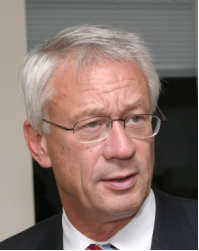 Biograph: Prof. L.P. Ligthart, Em. Prof. Delft University of Technology Chairman Conasense.
Biograph: Prof. L.P. Ligthart, Em. Prof. Delft University of Technology Chairman Conasense.
Career/Employment:
1968-2011 : Faculty of Electrical engineering, Delft University
1976-1977 : Chalmers University Gothenburg, Sweden
1988-2011 : Professor Microwaves, Remote Sensing and Radar, Delft University
1994-2011: Director IRCTR, Delft University of Technology
2011-present: Emeritus Prof. Delft University of Technology
2011-present: Chairman CONASENSE
2012-present: Adjunct-professor UI, Jakarta, Indonesia
2014-present: Adjunct-professor ITS, Surabaya, Indonesia
2014-present: Adjunct-professor Beijing Institute of Technology, China
2017-present: World Class Professor, Indonesia
Specialization
(i) Main fields: antennas & propagation, radar and remote sensing
(ii) Other fields: satellite, mobile and radio communication
Selection of Honours, Awards, Fellowships, Memberships of Professional Societies
Veder radio award, 1981
IEE-Blumlein-Brown-Willans Premium Award, 1982
FIET(1983), FIEEE (2001)
Doctor Honoris Causa MSTUCA, Russia, 1999
Doctor Honoris Causa TUCSR , Russia, 2001
Academician Russia (2000)
Tsiolkorsky Award (2003)
IEEE–MIKON award (2004)
Distinguished Service Award EuMA (2008)
Doctor Honoris Causa MTA, Romania, 2010
Selected activities in organisations
Board of Directors EuMA
Board of Governors IEEE AESS
International Director IEEE-AESS Europe
TUD Student Counsellor IET
TUD Student Counsellor IEEE
Member Organising Committee URSI2002 General Assembly, Maastricht
Chairman 28th EuMC , 1st EuMW98,
Chairman 1st EuRAD conference 2004
Scientific output
H-index: 35 and 5450 citations
Over 600 papers
4 Patents
7 books
Major achievements of Prof Ligthart, director of IRCTR-Delft University (1994-2011):
1.State of the art experimental research facilities in the field of antennas, radar and radio.
2.International co-operations with more than 21 universities and 23 scientific institutes.
3.Over 40 international Project Agreements.
4.Project leader in the field of polarimetric atmospheric radar, collision avoidance radar, GPR and wireless communications with support from industries and institutes
5.Co-operations in Russia and in Indonesia via IRCTR branches in Tomsk, Russia and Bandung, Indonesia
6.Founder of the first European Microwave Week (EuMW) in Amsterdam in 1998. Founding member of the European Microwave Association (EuMA)
7.Initiator of the yearly European Radar (EuRAD) conference in 2004
8.Advisor of over 55 PhD candidates
Title: Tutorial on Wide-Band, Wide-Angular Scanning Antennas for Future Radar
Abstract: In modern radio and radar the antenna arrays play an important multi-function role with respect to angular pattern and frequency characteristics. Most literature exists on so called 'dense' arrays with equidistant spacing between the antenna elements in the order of half the wavelength. Mutual coupling between the elements and wide-angular scanning requirements give degradation in the dense array performance and cause many headache problems for generations of antenna engineers.
For wide-angular scanning, individual transmit-receive modules are needed meaning that high gain dense antenna arrays with many elements are costly. In so called 'sparse' arrays the mutual spacing is larger. Sparse arrays are interesting because they use 'array thinning' and have therefore a potential lower cost.
In order to maximize the array efficiency in sparse phased array radar, the transmit power per element should be equal with a threat of high side lobes near the main lobe and unwanted grating lobes. For avoiding grating lobes in sparse arrays the spacing between elements should be non-equidistant. The so obtained spatial distribution of elements leads to a spatial field distribution over the array. Special design of this spatial field distribution can benefit the lowering of side lobes near the main lobe.